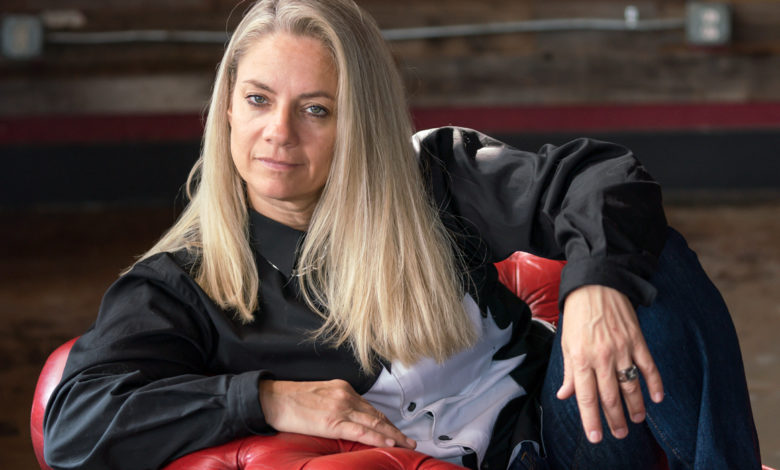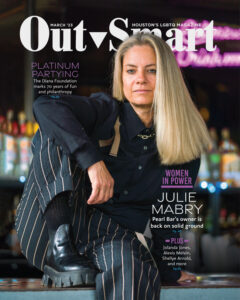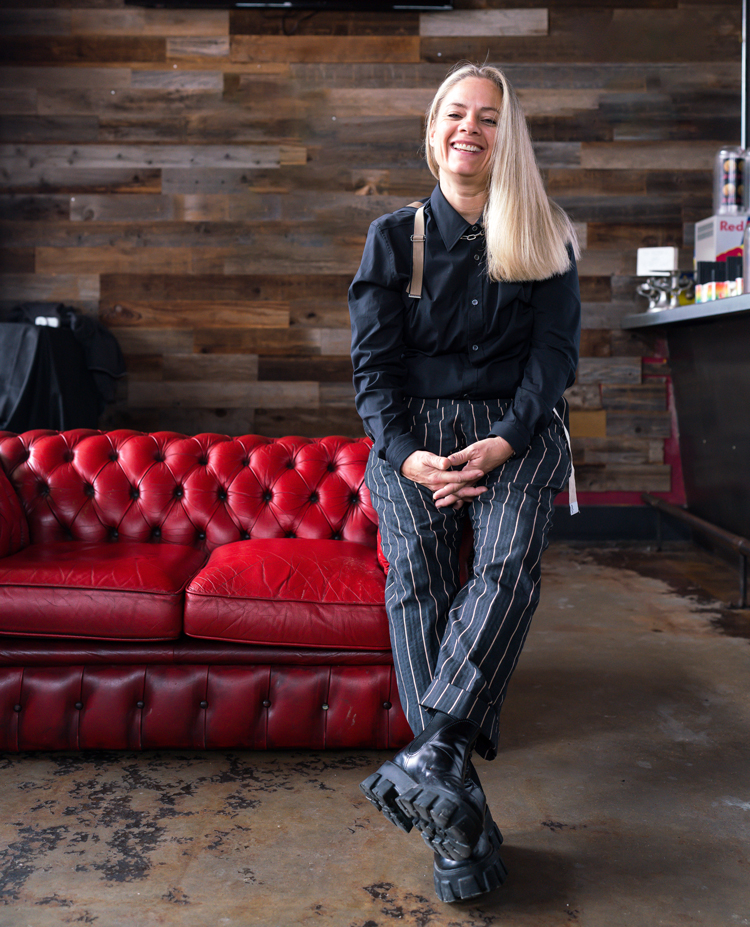
Mother of Pearl
Julie Mabry’s Pearl Bar is one of the few remaining lesbian bars in the US.
There’s an LGBTQ gathering place on Washington Avenue that is unique to, and rare in, the United States. Pearl Bar Houston, located between the Heights and Montrose neighborhoods, is one of just a few remaining lesbian-specific bars in the country. Helmed by owner Julie Mabry, the queer haven gained national notoriety during the pandemic. Facing financial uncertainty, Pearl Bar was featured in the

2022 documentary The Lesbian Bar Project— a film whose objective was to celebrate, support, and preserve the remaining lesbian bars in the US.
Today, Mabry finds herself on solid ground, both personally and professionally, and stands strong in her fight to protect safe spaces that are representative of the entire LGBTQ community.
“I’m 10 years alcohol free,” Mabry, who has lived in Houston for more than 28 years, says. “I was a cocaine addict and an alcoholic, and I have quit both of those. I was 11 months sober when I opened Pearl.”
Adorned with Pride flags, framed photos of lesbians throughout history lining the walls, a fully stocked bar awaiting eager bar-goers, and a quaint outdoor patio perfect for weekly crawfish events, Pearl is Mabry’s passion project birthed from a sisterly bond. “I have a sister who’s also gay, so I had an early exposure to the gay lifestyle,” she explains. “I came out when I was about 16. We went through a lot of hardships when we were younger, especially my sister, and I think that had to do with her identity. This was in the late ’80s and early ’90s, so I watched her struggle with a lot of things.”

While living in San Antonio, Mabry and her sister found community in the local gay bar scene. “We would go to a bar called The Bonham Exchange. It wasn’t a lesbian bar or anything specific, but it was a huge gay club. I always remembered how I felt, how safe it was, and being able to dress how we wanted,” she reminisces. “I had drawn a club [on a piece of paper during that time], because it was something I wanted,” she says. That visualization sketch worked, as Mabry explains with a laugh. “I don’t know what my problem was, but it was definitely my dream pretty much my whole life.”
A decade ago, Pearl Bar’s previous owner was facing eviction from the Washington Avenue space. Mabry was working at another nearby bar, and decided that rescuing the failing business was an opportunity to show some love to her community and realize her lifelong dream of bar ownership.
“The bar still had everything in there following its eviction, including that effeminate type of decor,” Mabry recalls. “At that time, the direction was to be specifically a lesbian bar, and luckily we were able to get it. It’s been a lot of work, but she’s still there.”
Officially opening its doors under Mabry’s ownership in October 2013, Pearl Bar wasted no time in reintroducing itself as the perfect queer bar for drinks, dancing, entertainment, community, and more. “Our drag king shows have really blown up, and it’s amazing to see. I typically bring in DJs that are mostly female-specific, and a lot of DJs from other cities and states,” Mabry says of her nightlife promotions. “We’ve had so many awesome entertainers. Big Freedia came in for the premiere of the documentary, and we’ve even had Charlie XCX and Fletcher.”
With nearly two decades of experience in the entertainment industry, it’s no wonder Mabry is able to bring in such engaging and high-profile talent. “I’ve been a lesbian event promoter for about 15 or 16 years. I was one of the original promoters at Blur, so I’ve been immersed in the lesbian promotion community for a really long time,” she explains.
The bar is more than just a business for Mabry, who uses her industry expertise to welcome a variety of acts into the unique venue. “What I like about Pearl is being able to bring in shows that would typically have to go to a bigger venue. [Many of these performers] consider Pearl to be their home. I definitely invest a lot in bringing well-known DJs and entertainers from other states and cities, so that they also see how much great entertainment we have in our community. A lot of the shows we try to bring in are lesbian and trans performers, and that’s how it’s always kind of been. I think it’s sexy.”
During the pandemic, Pearl was faced with the challenge of staying financially stable as Houston bars shut down for months. “I had written this letter on Instagram to Ellen Degeneres and asked her if she’d be our ‘lesbian-bar sugar mama.’ I was just trying to be comical, but at the same time, I was frozen in fear with everything.”

Mabry’s attempt to gain support via social media caught the eye of documentary filmmakers Erica Rose and Elina Street, as well as actor and producer Lea Delaria, of Orange Is the New Black fame, among other credits. The team was interested in covering Mabry’s establishment after learning that it is one of fewer than 30 lesbian bars currently operating in the United States.
“The Lesbian Bar Project documentary came up within the first four months of the pandemic,” Mabry explains. “Most lesbian bars don’t have a huge amount of disposable income. They were going to use [Delaria’s film] as a fundraising tool.”
But as the documentary project progressed, Houston’s LGBTQ community rallied to donate over $40,000 in an effort to save Pearl. Mabry was no longer feeling the sting of financial uncertainty, so she saw Pearl’s involvement in the documentary more as a means of educating the public and supporting other lesbian bars. “The direction with The Lesbian Bar Project was to shed light on why lesbian bars have been declining over the past 20 years, and focus on the ones that are still here,” Mabry notes. “[After the project’s two national fundraising drives raised almost $200,000], I donated our part back both times. I thought it was cool what they were doing, mainly for the bars on the East Coast and in California that couldn’t open as soon as we could.
“I do still think that there’s a necessity for our bars, because that’s our safe haven.”
—Julie Mabry
“I think what’s happened is our community has grown so much, and we have been more accepted than ever,” she says. “A lot of people think we still have a lot of things to fight for, but in general—especially in Houston—our community is very much supported. I think we have one of the most amazing cities, [where] lesbians, or even our larger queer community, don’t have to go to a specifically queer or lesbian bar anymore. Lesbians used to go to lesbian bars because they didn’t want to be judged. I think that a lot of us realize that it’s changed a lot. I still think there’s a necessity for lesbian-specific bars and queer bars, because lesbians do want to go out if they drink. They want to be able to hit on someone that isn’t some guy’s girlfriend. I do think lesbian bars are always going to be a necessity, but at the same time, it’s been pretty cool to watch everything evolve. I’m 49, and a lot of the younger generation—both lesbians and the larger queer community—go to straight clubs. I think it’s an awesome thing, but I do still think that there’s a necessity for our bars because that’s our safe haven.”
There’s no doubt that Mabry’s contributions to Houston’s lesbian and queer communities have had an immeasurable impact—even on out-of-towners she’s never met. “After The Lesbian Bar Project came out, we were contacted by people from all around the world, and a lot of younger people that didn’t even know that lesbian bars exist,” she says. “I know that sounds crazy, but it’s true. For a lot of us, we definitely find ourselves in a very small community.”
Her sobriety is an achievement that has led her down a path of success as she looks forward to Pearl’s future and the impact it can have on both regulars and newcomers who pass through its wooden doors with glass windows. “A lot of people go to my bar, and probably 15 or 20 have told me that they want to quit drinking or quit doing drugs. And they have! But they still come to Pearl, because that’s their safe place,” she says. “I think my message, and what I want everyone to see about Pearl, is our ability to persevere and still provide a safe environment for our community.”
Follow Pearl Bar Houston at pearlhouston.com; The Lesbian Bar Project is available for free streaming on Roku.










